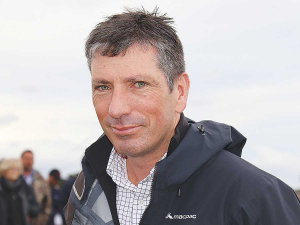M.I.A.
OPINION: The previous government spent too much during the Covid-19 pandemic, despite warnings from officials, according to a briefing released by the Treasury.
 Beef+Lamb NZ chief executive Sam McIvor says farmers should plan the worst case scenario in terms of Covid-19.
Beef+Lamb NZ chief executive Sam McIvor says farmers should plan the worst case scenario in terms of Covid-19.
Plan for the worst case scenario in terms of Covid-19.
That's the message to farmers from Beef+Lamb NZ chief executive Sam McIvor. He says farmers need to have a clear plan, mapped out and written up to ensure that their farming operations can carry on if they contract Covid.
McIvor says sheep and beef farmers are often owner-operators and could be isolated by distance, which makes their situation all the more complicated. He says not only do farmers have to care for their family and workers, they also have to take care of animals.
"Farmers should get vaccinated to manage that risk, they should manage the infection risk from others - in other words put in place a personal biosecurity protocol - and they must base their plan on the worst case scenario," McIvor says.
"This means if a farmer becomes infected and a local district health board says they need to go into isolation off farm, what happens?"
According to McIvor, farmers need to have someone set up and ready so they can ring them at the drop of a hat to come in and help, for a couple of days at least. And then plan what might happen thereafter. He says farmers should put in writing all the critical information that person would need to know coming on to their farm - including health and safety protocols.
"Farmers need to be thinking ahead and thinking what might happen if they have to isolate for two or three weeks. They also need to think whether they get a mild dose or a severe dose of Covid and how that might affect their operation," he adds.
McIvor says farmers can look at options and perhaps decide to set stock, as opposed to rotational grazing. He says they could see whether it's possible to delay planting dates for crop and work out if that was an option.
He says it's about thinking about those critical things that need to happen and having a plan around them to minimise the impact on their business.
"Think about what your risk profile is in terms of spread from your farm to others!" McIvor adds.
He says it's not only thinking about the impact on individual farmers, but also the potential impact on others in the value chain as well.
He says this is especially the case given that the industry is approaching the peak of the killing season.
One of New Zealand’s longest-running pasture growth monitoring projects will continue, even as its long-time champion steps away after more than five decades of involvement.
The Insurance & Financial Services Ombudsmen Scheme (IFSO Scheme) is advising consumers to prepare for delays as insurers respond to a high volume of claims following this week's severe weather.
Additional reductions to costs for forest owners in the Emissions Trading Scheme Registry (ETS) have been announced by the Government.
Animal welfare is of paramount importance to New Zealand's dairy industry, with consumers increasingly interested in how food is produced, not just the quality of the final product.
Agriculture and Forestry Minister Todd McClay is encouraging farmers and growers to stay up to date with weather warnings and seek support should they need it.
The closure of SH2 Waioweka Gorge could result in significant delays and additional costs for freight customers around the Upper North Island, says Transporting New Zealand.

OPINION: If the hand-wringing, cravat and bow-tie wearing commentariat of a left-leaning persuasion had any influence on global markets, we'd…
OPINION: With Winston Peters playing politics with the PM's Indian FTA, all eyes will be on Labour who have the…